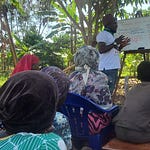Permaculture's third ethic, Fair Share (also sometimes phrased as Share the Surplus or Redistribute the Surplus, is a profound principle that extends the first two ethics—Earth Care and People Care—into the realm of equity, justice, and community resilience. Let’s unpack its themes and ideas:
1. Core Meaning of Fair Share
- Limiting Consumption: It emphasises taking only what we need and ensuring that resources (food, water, energy, etc.) are distributed equitably among all beings (humans, animals, ecosystems).
- Redistributing Surplus: Instead of hoarding or wasting excess, permaculture encourages sharing surplus yields—whether it’s food, knowledge, seeds, or labour—to strengthen community ties and reduce inequality.
Systemic Equity: It critiques exploitative systems (like capitalism’s over-extraction) and promotes models where wealth and resources circulate fairly.
2. Key Themes
A. Personal and Collective Responsibility
- Self-Regulation: Recognising when we have enough and refusing to over-consume.
- Community Mutual Aid: Creating systems like seed libraries, tool-sharing, or cooperative land management.
- Intergenerational Equity: Ensuring future generations have access to resources (e.g., saving seeds, restoring degraded land).
B. Economic Justice
- Local Economies: Supporting fair trade, barter systems, or alternative currencies.
- Challenging Greed: Opposing monopolies and advocating for workers’ rights, land reform, and regenerative business models.
- Open-Source Knowledge: Sharing permaculture designs freely (as Bill Mollison and David Holmgren did) rather than patenting or profiting exclusively.
C. Ecological Balance
- Wildlife and Biodiversity: Leaving resources for non-human species (e.g., not overharvesting, creating wildlife corridors).
- Waste as a Resource: Composting, recycling, and repurposing to minimise depletion.
D. Cultural and Global Solidarity
- Decolonising Land and Knowledge: Acknowledging indigenous stewardship practices and supporting land justice.
- Global Fairness: Addressing the Global North’s overconsumption and its impact on the Global South (e.g., climate debt, resource extraction).
3. Practical Applications
- Community Gardens: Surplus produce donated to food banks.
- Land Trusts: Collective ownership to prevent speculation and ensure access.
- Skill-Sharing Workshops: Free or sliding-scale permaculture courses.
- Water Harvesting: Sharing rainwater with neighbours or replenishing aquifers.
- Gift Economies: Potlucks, seed swaps, or "buy nothing" groups.
4. Challenges and Critique
- Scarcity Mindset: Some fear sharing will lead to a lack, but permaculture argues that abundance emerges from cooperation.
- Systemic Barriers: Capitalism and privatisation often oppose fair-share models.
- Scale Dilemmas: How to apply this ethic globally while acting locally (e.g., wealthy nations reducing consumption to free up resources for others).
5. Philosophical Roots
- Inspired by indigenous wisdom (e.g., the Seventh Generation Principle).
- Aligns with commons-based thinking (Elinor Ostrom’s work) and eco-socialism.
- Reflects Buddhist/ Taoist ideas of moderation and interdependence.
6. Quotes to Reflect On
- "The earth produces enough for everyone’s need, but not for everyone’s greed." —Mahatma Gandhi
Fair Share is about love in action—not just feeling, but doing."—Starhawk
Final Thought
Fair Share isn’t just charity; it’s a systemic redesign to create cycles of reciprocity. By applying it, we move from "me" to "we," aligning human systems with nature’s wisdom of abundance through balance.














Share this post